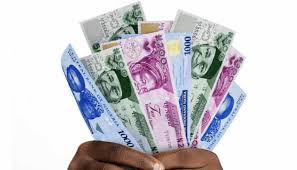
Global trade war: Naira declines in value due to foreign exchange outflows.
The ongoing tariff conflict between the United States and several nations has led to a significant outflow of foreign exchange from Nigeria, resulting in a two-week decline in the value of the naira.
In response, the Central Bank of Nigeria (CBN) intervened in the foreign exchange market last week, selling up to $500 million to enhance supply.
Despite this intervention, the naira continued to depreciate on a week-on-week basis, falling by N55 to reach N1,600 per dollar in the parallel market, marking its lowest value in five weeks since February 5.
In the official market, the naira also experienced a week-on-week decline, decreasing by N6 to N1,548 per dollar. The global economy is currently facing significant uncertainty due to the tariff disputes involving the United States, Canada, Mexico, China, and the European Union.
The situation intensified last week with the implementation of a 25 percent tariff on all metal imports into the United States, prompting other nations, including the European Commission, to announce retaliatory measures. Concerns that this tariff war could lead to increased inflation and a potential global economic recession have created unease within the investment community, resulting in considerable losses in global stock markets as investors shifted their assets to safer alternatives.
Reflecting the impact of these escalating trade tensions on investor sentiment, the MSCI World Index, which monitors the performance of 1,500 stocks across 23 developed countries, declined by 2.1% week-on-week. Similarly, the Nigerian stock market (NGX Exchange) fell for the second consecutive week, decreasing by 0.5 percent. An investigation by Financial Vanguard revealed that the anxiety stemming from global uncertainty has led some foreign portfolio investors to withdraw their funds from Nigeria.
A senior banking executive, who requested anonymity, stated, “They liquidated their investments in assets such as bonds, treasury bills, and equities, and subsequently approached the foreign exchange market to purchase dollars.” He noted that their persistent demand prompted local investors, who had been hesitant and waiting for the naira to strengthen, to enter the market and begin acquiring dollars as well.
“Simultaneously, concerns regarding the naira's depreciation incited panic buying, further intensifying the demand in the foreign exchange market,” he added. An analysis by Financial Vanguard of data from the Nigerian Exchange (NGX) indicated that this trend may have begun in January. The data revealed that foreign investment outflows from the stock market surpassed inflows by 78 percent in January.
The market experienced a foreign outflow of N45.85 billion, compared to a foreign inflow of N25.66 billion. Notably, foreign outflows rose by 13.2 percent to N45.85 billion in January 2025, up from N40.49 billion in December 2024, while foreign inflows saw a slight decline of 2.3 percent, decreasing from N26.26 billion in December 2024 to N25.66 billion in January 2025. An investigation by Financial Vanguard revealed that the increasing trend in foreign exchange outflows led to a scarcity of dollars, which in turn caused a consistent depreciation of the naira across both segments of the foreign exchange market, negating the gains achieved in the initial two months of the year.
As a result, between February 26 and March 14, the naira depreciated by 7.4 percent in the parallel market, falling to N1,600 per dollar from N1,490. Similarly, in the official market, the naira experienced a depreciation of 3.3 percent during the same period, dropping to N1,548 per dollar from N1,499.
Currency dealers in the parallel market have expressed concerns that the naira's significant depreciation is due to a limited supply of dollars, influenced by various factors.
A chief executive of a Bureau De Change (BDC) informed Vanguard that banks have ceased selling the $25,000 weekly allocation approved by the Central Bank of Nigeria (CBN) to BDCs. "They provided us with dollars for a period, but they stopped two weeks ago, citing a lack of available dollars for sale. They also mentioned they are reassessing the exchange rate, which is contributing to the rising dollar prices," he stated. Parallel market currency trader Mallam Tijani Yusuf remarked, "Today (Friday), I sold a dollar for N1,600, having purchased it at a rate between N1,570 and N1,575. Just two weeks ago, the dollar was trading at N1,400 to N1,500. The increase to N1,600 is driven by ongoing demand and supply pressures, which have intensified recently. I cannot predict next week's rates, as market fluctuations are unpredictable."
Another currency trader, Mr. Farouk Yahaya, noted, "Individuals are no longer selling their dollars to us; they prefer to deposit them directly into their bank accounts. Additionally, the difference between the banks' buying and selling rates and those in the parallel market is minimal, which further diminishes our dollar sales. Banks now have a substantial dollar supply and can better meet customer needs, unlike the parallel market, where demand is high and supply is limited." Mr. Nasir Danjuma added, "This morning, I sold a dollar for N1,650. The exchange rate closed around N1,600 today (Saturday), compared to N1,590 yesterday (Friday). While demand remains consistent, supply is deteriorating. Accessing dollars has become increasingly challenging, and if this trend continues into next week, the naira may depreciate further, potentially reaching the N1,680 to N1,690 range, or in a worst-case scenario, hitting N1,700."
There is a pressing need for intervention from the CBN.
Aminu Gwadabe, the President of the Association of Bureaux De Change Operators of Nigeria (ABCON), has attributed the ongoing depreciation of the naira to various factors and underscored the necessity for intervention by the Central Bank of Nigeria (CBN) to ensure a stable supply of dollars in the foreign exchange market.
He stated, "The recent decline of the naira, marked by increased volatility, is concerning for many stakeholders. Some analysts point to the traditional dynamics of supply and demand, noting a surge in demand coupled with a constrained supply.
"Nevertheless, a multitude of factors, including excessive unearned income pressures on the exchange rate, restrictive policies, resistance from speculators, a diminishing confidence in the naira as a store of value, and various discretionary demands, have intensified the demand pressures within the market.
"The immediate solution lies in the CBN reinforcing its pivotal role in the market by implementing consistent supply measures to mitigate speculative activities.
"The sale of dollars by banks to Bureaux De Change, as sanctioned by the CBN, should be prioritized, accompanied by mechanisms, oversight, and a framework to enhance efficiency. Furthermore, it is crucial for the central bank to provide forward guidance on their policy resilience and the associated benefits to curb illegal economic practices."





